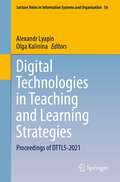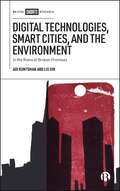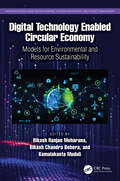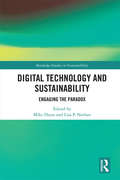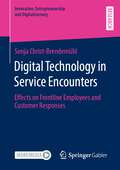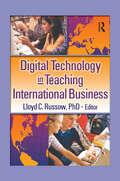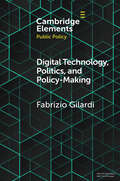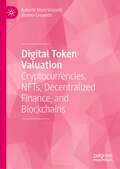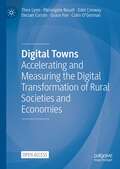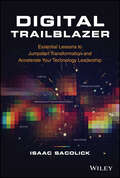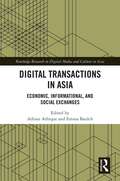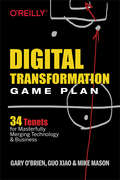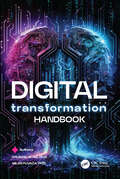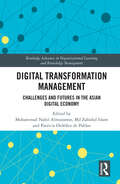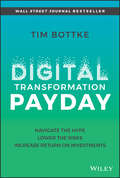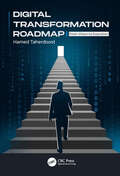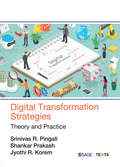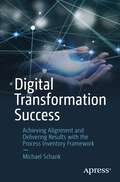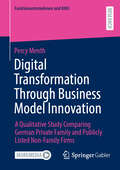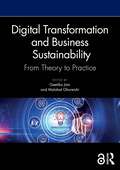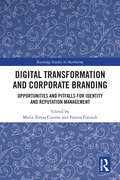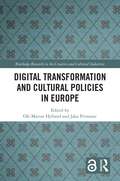- Table View
- List View
Digital Technologies in Construction Engineering: Selected Papers (Lecture Notes in Civil Engineering #173)
by Sergey Vasil’yevich KlyuevThis book gathers the latest advances, innovations, and applications in the field of construction engineering, as presented by researchers and engineers at the Digital Technologies in Construction Engineering conference, held in Belgorod, Russia, on June 8-9, 2021. It covers highly diverse topics, including industrial and civil construction, building materials; environmental engineering and protection; sustainability; structure safety and special construction structures. The contributions, which were selected by means of a rigorous international peer-review process, highlight numerous exciting ideas that will spur novel research directions and foster multidisciplinary collaborations.
Digital Technologies in Teaching and Learning Strategies: Proceedings of DTTLS-2021 (Lecture Notes in Information Systems and Organisation #56)
by Alexandr Lyapin Olga KalininaThis book demonstrates the benefits and drawbacks of using digital technology in preparing online lessons and educational activities. The experience of the last year has shown that online education is becoming a priority. This gave impetus to the creation and development of a new generation of equipment for online education. The book presents latest innovative technologies and modern digital trends in the field of information and communication technology for online education, including personalized learning, neuro-information systems, mobile learning, development of software and hardware infrastructure, and the use of robotics technologies. Key technologies for managing risk and cybersecurity, such as cloud and data security, identity and trust convolution systems, computational intelligence and cryptography techniques, malware and attack analysis, are presented. The topic of cybersecurity is one of the most important issues in the modern digital world. The results of the research on recently developed software, decision support systems, and cloud technologies make a huge contribution to the development of information technology in the context of digitalization.This book is of interest for developers of applications and programs for online education, for software and hardware suppliers who want to keep up with the times and reorient existing IT systems for use in online education.
Digital Technologies, Smart Cities, and the Environment: In the Ruins of Broken Promises
by Adi Kuntsman Liu XinThe concept of smart cities holds environmental promises: that digital technologies will reduce carbon emissions, air pollution and waste, and help address climate change. Drawing on academic scholarship and two case studies from Manchester and Helsinki, this timely and accessible book examines what happens when these promises are broken, as they prioritise technological innovation rather than environmental care. The book reveals that smart cities’ vision of sustainable digital future obfuscates the environmental harms and social injustices that digitisation inflicts. The framework of “broken promises”, coined by the authors, centres environmental questions in analysing imaginaries and practices of smart cities. This is a must read for anyone interested in the connections between digital technologies and environment justice.
Digital Technology Enabled Circular Economy: Models for Environmental and Resource Sustainability (Advances in Intelligent Decision-Making, Systems Engineering, and Project Management)
by Kamalakanta Muduli Bikash Chandra Behera Bikash Ranjan MoharanaThis book presents cutting-edge findings that draw on the use of AI, the Industrial Internet of Things, Blockchain, and Co-Analytics for the development of Circular Economy (CE) models to make organizational activities more sustainable. A further goal is the development of Digital Technology (DT)–enabled support tools that can be used to further analyze the impact of DT and CE–enabled operational practices used to achieve resource and environmental sustainability.Digital Technology Enabled Circular Economy: Models for Environmental and Resource Sustainability discusses the integration of digital technology-enabledcircular economy models into the manufacturing industries and its advantages for sustainability. It emphasizes the fundamentals and applications and their enactment, as well as integration for the overall organizational development. The book explains the role of digital technologies in food supply chains and multi-life cycle materials for sustainable development and highlights the development of the workforce to facilitate the implementation of smart and advanced technologies. This book presents the development of DT–enabled support tools used to analyze the impact of DT and CE–enabled operational practices on an organization and efforts to achieve resource and environmental sustainability. Case studies that demonstrate how smart digital technology can help firms improve their long-term performance by embracing circular operation methods are also included.Students, academicians, and researchers, as well as managers and stakeholders who are interested in smart, sustainable production, and consumption, together with managers and stakeholders who are interested in ways of implementing them in their organizations, will find this book of interest. It will demonstrate, via the use of real-world case studies, how smart digital technology can help firms improve their long-term performance by embracing circular operating methods.
Digital Technology and Sustainability: Engaging the Paradox (Routledge Studies in Sustainability)
by Mike Hazas Lisa NathanThis book brings together diverse voices from across the field of sustainable human computer interaction (SHCI) to discuss what it means for digital technology to support sustainability and how humans and technology can work together optimally for a more sustainable future. Contemporary digital technologies are hailed by tech companies, governments and academics as leading-edge solutions to the challenges of environmental sustainability; smarter homes, more persuasive technologies, and a robust Internet of Things hold the promise for creating a greener world. Yet, deployments of interactive technologies for such purposes often lead to a paradox: they algorithmically "optimize" heating and lighting of houses without regard to the dynamics of daily life in the home; they can collect and display data that allow us to reflect on energy and emissions, yet the same information can cause us to raise our expectations for comfort and convenience; they might allow us to share best practice for sustainable living through social networking and online communities, yet these same systems further our participation in consumerism and contribute to an ever-greater volume of electronic waste.By acknowledging these paradoxes, this book represents a significant critical inquiry into digital technology’s longer-term impact on ideals of sustainability. Written by an interdisciplinary team of contributors this book will be of great interest to students and scholars of human computer interaction and environmental studies.
Digital Technology in Service Encounters: Effects on Frontline Employees and Customer Responses (Innovation, Entrepreneurship und Digitalisierung)
by Sonja Christ-BrendemühlDigital technology is disrupting the prerequisites for most firms in the service industry and frequently forces them to reassess the ratio of human interaction and technology use in service encounters. To retain competitiveness, it seems mandatory to increase service encounter efficiency by embedding digital technology into the existing processes. However, there is little empirical evidence on how such technological implementations affect the sentiments, attitudes, and behaviors of frontline employees. Likewise, research on interrelated customer responses is scarce. To address this matter, this book presents four distinct yet related studies to investigate the impact of digital technology on frontline employees, customers, and ultimately service firms. The results and implications provide meaningful insights for theory and practice.
Digital Technology in Teaching International Business
by Erdener Kaynak Lloyd RussowExplore the potentialand the pitfallsof digital technology in international business courses! Digital Technology in Teaching International Business will familiarize you with techniques that have proven effective in digitizing content or presenting traditional material in an untraditional way. You'll learn how to introduce digital technologies into bricks and mortar classrooms and how to construct an effective online learning environment. This timely and informative book discusses computer-mediated communication systems, shows how students can use the Internet to personally participate in international problem-solving exercises, presents a fascinating case study of a CLD program designed to address educational values, communication competencies, and business practices in former republics of the Soviet Union, and much more! Digital Technology in Teaching International Business outlines the challenges and demands of the knowledge-based economy and discusses the path that universities should follow in providing business students with the skills they need to succeed in this complex environment. It describes the implementation of Internet-based experiential projects in an international business classroom setting and summarizes students' perceptions and attitudes toward their assignments. In addition, it shows how to adapt experiential exercises from live courses for electronic application and examines ways in which electronic media can: increase the availabilityand reduce the costof interactive programs that connect students from distant locations complement or replace the traditional roles of textbooks and teachers promote more interactive learning enable faculty, students, scientists, technicians, entrepreneurs, and NGO leaders in separate locations to collaborate effectively help to overcome the developed-country bias present in many business strategy courses via specially designed courses and simulations of emerging economies aid in teaching financial reporting and the analysis of multinational enterprises address the traditional tradeoffs between richness (depth of knowledge) and reach (geographic area coverage)
Digital Technology, Politics, and Policy-Making (Elements in Public Policy)
by Fabrizio GilardiThis element shows, based on a review of the literature, how digital technology has affected liberal democracies with a focus on three key aspects of democratic politics: political communication, political participation, and policy-making. The impact of digital technology permeates the entire political process, affecting the flow of information among citizen and political actors, the connection between the mass public and political elites, and the development of policy responses to societal problems. This element discusses how digital technology has shaped these different domains, identifies areas of research consensus as well as unresolved questions, and argues that a key perspective involves issue definition, that is, how the nature of the problems raised by digital technology is subject to political contestation.
Digital Token Valuation: Cryptocurrencies, NFTs, Decentralized Finance, and Blockchains
by Roberto Moro-Visconti Andrea CesarettiThis book looks at the analogic application of standard corporate valuation approaches to trendy digital tokens, expressed by cryptocurrencies, and validated through blockchain systems. Whereas traditional firm appraisal follows institutional guidelines and best practices, frontier research still must define the boundaries of these trendy issues, linking a strong theoretical background to practical advances that still need fine-tuning. This book, written by an academic and a senior consultant, combines theoretical rigor with practical insights, providing an innovative framework for evaluators, managers, and practitioners, and academics of corporate valuation and financial technology.
Digital Towns: Accelerating and Measuring the Digital Transformation of Rural Societies and Economies
by Colm O'Gorman Pierangelo Rosati Declan Curran Theo Lynn Grace Fox Edel ConwayThis open access book explores the digital transformation of small and rural towns, in particular, how to measure the evolution and development of digital towns. In addition to access to resources, competition from urban and global markets, and population trends, rural communities present lesser access and use of digital technologies and have lower digital competencies and skills than their urban counterparts. Consequently, they experience less beneficial outcomes from increased digitalisation than urban areas. This book defines what a digital town is and explores digitalisation from the perspective of the four basic economic sectors in towns - individuals and households, businesses, the public sector, and civil society - and three types of enabling infrastructure - digital connectivity, education, and governance. Particular attention is paid to how digitalisation efforts are measured by intergovernmental and international organisations for each sector and enabling infrastructure. The book concludes with a Digital Town Readiness Framework that offers local communities, policymakers, and scholars an initial set of indicators upon which to develop digital town initiatives, and measure progress. For those ready to embrace the opportunity, this book is a pathfinder on the road to a more equitable and impactful digital society and digital economy.
Digital Trailblazer: Essential Lessons to Jumpstart Transformation and Accelerate Your Technology Leadership
by Isaac SacolickInvaluable stories and lessons that will help you tackle one of the most challenging jobs in technology and business – leading transformation In Digital Trailblazer: Essential Lessons to Jumpstart Transformation and Accelerate Your Technology Leadership, Isaac Sacolick, a technology leadership expert and a former CIO and CTO, delivers a hands-on guide to help technology and business professionals at all stages of their careers acquire the skills necessary to drive transformative change. With an eye-opening collection of stories and more than 50 lessons, Sacolick gives readers a view into what goes on behind-the-scenes in leading digital transformations. From tense IT Ops conference calls to make-or-break executive meetings, Sacolick presents the challenging scenarios faced by product, technology, and data leaders and helps readers learn to lead transformations and become Digital Trailblazers. In the book you will: Step out of your comfort zone and develop the management and leadership skills required to influence executives and win over detractors in driving technology changes Learn how to transform experiences, lead data driven organizations, and foster high performance teams Discover how to deliver innovation, empower agile self-organization, and evolve standard digital practices that drive culture changes in your organization A can&’t-miss resource for product, technology, and data leaders – from those aspiring to leadership roles through vice presidents, CIOs, CTOs, and CDOs, Digital Trailblazer delivers real-word stories and need-to-know lessons that will accelerate your technology leadership journey.
Digital Transactions in Asia: Economic, Informational, and Social Exchanges (Routledge Research in Digital Media and Culture in Asia)
by Emma Baulch Adrian AthiqueThis book presents a comprehensive overview of transactional forms of the digital across the Asian region by addressing the platforms and infrastructures that shape the digital experience. Contributors argue that each and every encounter mediated by the digital carries with it a functional exchange, but at the same time each transaction also implies an exchange based on social relationships for the digital age. In capturing the digital revolution through case studies of economic, informational, and social exchanges from across the larger Asian region, the book offers a richly contextualized and comparative account of the pervasive nature of the digital as both a medium for action and a medium of record.
Digital Transformation 2.0: CEO Elie Girard at Atos
by Tsedal Neeley James BarnettElie Girard has taken the helm as CEO of Atos-multinational IT giant-to lead the company into the next era of digital transformation. Noticing that customers' digital needs were evolving to become even more specialized and global in scope, he made a bold first step as leader: restructure the organization from a service-based model to a portfolio built around specific industry verticals, while competitors were moving in the other direction with the conviction that digital disruption had dissolved industry barriers. Underpinning Girard's new digital blueprint were four pillars - the cloud, data, cybersecurity, and decarbonization - which he had fortified with a steady M&A strategy resulting in nine acquisitions. But decarbonization - reducing carbon emissions into the atmosphere through strategic use of digital technology - was a brand-new dimension with big questions about its feasibility. The environmental approach was controversial in different parts of the world. To add to the uncertainty, the COVID-19 pandemic had suddenly turned the world upside down, forcing organizations to transition into remote work overnight. In the middle of a global health crisis and ensuing economic fallout, could Girard afford to make such drastic organizational structure changes that flew in the face of industry trends? Would his decision disqualify Atos from the race with competitors, or was it the only way to serve customers in even greater need of digital solutions?
Digital Transformation Game Plan: 34 Tenets for Masterfully Merging Technology and Business
by Mike Mason Gary O'Brien Guo XiaoThe Digital Age is having a broad and profound impact on companies and entire industries. Rather than simply automate or embed digital technology into existing offerings, your business needs to rethink everything. In this practical book, three ThoughtWorks professionals provide a game plan to help your business through this transformation, along with technical concepts that you need to know to be an effective leader in a modern digital business.Chock-full of practical advice and case studies that show how businesses have transitioned, this book reveals lessons learned in guiding companies through digital transformation. While there’s no silver bullet available, you’ll discover effective ways to create lasting change at your organization.With this book, you’ll discover how to:Realign the business and operating architecture to focus on customer valueBuild a more responsive and agile organization to deal with speed and ambiguityBuild next generation technology capability as a core differentiator
Digital Transformation Handbook
by Krunoslav Ris Milan PuvačaDigital transformation has become more than a buzzword from the media since companies figured out the importance of rethinking business processes during global challenges. On its own, the term assumes integration of digital technology into all areas of a business, resulting in fundamental changes to how the company operates and delivers value to customers. Taking care of and choosing the optimal ICT tools is a constant struggle; the final decision may depend on the consultant’s experience. Including all business stakeholders in this process is a must. Creating innovative company culture, continuous learning, and developing new skills with flexible and open communication and willingness to experiment are a challenge. This complex, comprehensive approach can include implementing new systems, integrating existing systems, and using data analytics and artificial intelligence (AI) or machine learning to drive better outcomes. By adapting and exploiting digital technology in new ways, businesses can gain better and more detailed customer experiences and build stronger relationships with their clients. In addition, digital transformation can help organizations to be more agile and responsive, which can lead to less time needed for different processes or the ability to adapt quickly to changing conditions. In a time when change is the only constant – and it is hitting us every day not to forget about that – it is essential to think about digital transformation constantly. Technology improvement, availability, and scalability give us no room for excuses for not using them. Who can say that we are not living in dynamic and exciting times? The Authors have taken their 20 years of practical experience and put it into this handbook, in which many cases can be found where not every time is a success story. This book is prepared to provide some insights, give you a fresh overview of what such change can enable, and set up an environment for new technology that will arrive shortly.
Digital Transformation Management: Challenges and Futures in the Asian Digital Economy (Routledge Advances in Organizational Learning and Knowledge Management)
by Patricia Ordóñez de Pablos Mohammad Nabil Almunawar Md Zahidul IslamThis book addresses key topics related to organization design and knowledge management in the digital economy with organizational context, particularly in Asia. Asian nations are moving fast toward the digital economy, within which the role of organization design and knowledge management is crucial to support innovative and creative ideas for meeting huge market opportunities where customers are ready for digitalization. The book conceptualizes organization design into three dimensions, people, information, and technology, and offers readers a unique valued insight, bringing new perspectives to understanding emerging business opportunities and challenges in Asia. It presents a valuable collection of 14 chapters with empirical studies from leading researchers. The book addresses digital transformation in companies and organizations in Asia, analysing how disruptive technologies can help them have more efficient organization processes, create innovative products and services, be more resilient and achieve sustainable goals in the post-pandemic time. It fills a gap in the market offering a valuable collection of chapters that combines strategic topics for companies, organizations and nations today, such as digital economy, disruptive technologies, big data and knowledge management, with a specific focus on the Asian region, providing rich examples and studies focused in countries and regions within Asia. Written for scholars, researchers and other specialists in digitalization, this book offers a unique collection of insights into the current and future situation in Asia.
Digital Transformation Payday: Navigate the Hype, Lower the Risks, Increase Return on Investments
by Tim BottkeThe Data-Driven Guide for your Digital Transformation Payday In Digital Transformation Payday: Navigate the Hype, Lower the Risks, Increase Return on Investments, Tim Bottke, Senior Strategy Partner at Deloitte and Associate Professor for Strategy and Digital Transformation at SDA Bocconi, a Financial Times/Forbes/Bloomberg Businessweek Top-Five European business school, delivers a provocative, new perspective on digital business transformation—using research to get beyond the hype and uncover its real financial payback. Have you ever asked yourself: “Should I really embark on a digital transformation journey that is likely full of pain, failure, and high cash-outs? One that puts a lot of pressure on our stock price and my nerves? Who will thank me for that? Will there ever be a measurable return on invest for all these technologies that supports positive market value impact?” If so, this book is for you. You’ll find unique insights and guidance for managers, executives, board members, and investors as you navigate an immense array of strategic and operational choices, opportunities, and pitfalls. You’ll also learn to demystify digital strategy and technology buzzwords, better define the initial focal point and process of your firm’s digital transformation, and establish new ways of thinking in terms of value impacts—and how to measure them—right from the start. The book also includes: A proven framework for defining your next digital transformation effort end to end, and configuring your initiatives for maximum return on investment Empirical data to help you understand your company’s odds of navigating your chosen digital transformation initiatives with financial payback An indispensable resource for business leaders, Digital Transformation Payday will also earn a place in the libraries of entrepreneurs, founders, leaders of established companies, and digital enthusiasts.
Digital Transformation Roadmap: From Vision to Execution
by Hamed TaherdoostIn a world undergoing rapid technological evolution, this is your indispensable guide to thriving in the digital age. Digital Transformation Roadmap: From Vision to Execution offers a comprehensive exploration of the Fourth Industrial Revolution by presenting a roadmap for leveraging technology to revolutionize businesses, strategy, and innovation.Embark on a journey that unveils the dynamic interplay between technology and business. Discover the evolution of tech life cycles, the significance of digital transformation, and the key domains of change reshaping industries. Explore strategies to gain competitive advantage, from reimagining business models to aligning digital visions with organizational goals. Experience a holistic approach to digital transformation.Learn how to empower employees, foster a culture of innovation, and navigate change adeptly. Delve into the world of emerging technologies such as AI, IoT, and blockchain, and harness their potential to open new avenues for growth.From cybersecurity roadmaps to measuring system performance, uncover essential practices to ensure the resilience and success of digital initiatives. Master the art of delivering exceptional digital customer experiences and harnessing the value of data.Whether you’re a business leader, strategist, or tech enthusiast, this book equips you with actionable insights, practical strategies, and a forward-thinking mindset to drive change and thrive in the digital landscape.
Digital Transformation Strategies: Theory and Practice
by Srinivas R. Pingali Shankar PrakashThis textbook offers a unique combination of theory, practical applications and case studies on digital transformation strategies. Digital transformation is the process of changing conventional business models enabled by digital technologies. This involves strategically deploying digital technologies to create differential value of an organization. Digital transformation encompasses strategy changes, business model innovation, product and process innovation, and organizational innovation, all wrapped in a layer of newer technologies. This textbook helps define transformation and digitalization and contrasts them with digitization and automation. The book also presents a comprehensive digital strategy framework and describes each of its elements through several examples and exhibits. It provides useful insights into industry-specific cases, suggests detailed templates for digital implementation, and describes the risks in execution of digitalization and potential mitigation strategies. Key Features: • Covers all the key aspects of digital transformation required to build a career in consulting and implementation of digital strategy in business • Cases and examples from multiple industrial sectors to aid understanding of real-life practices and implementation of digital transformation • Structured in a reader-friendly manner to engage students, instructors, and junior and mid-level executives • Assumes no prior understanding of strategy, product development or process innovation
Digital Transformation Success: Achieving Alignment and Delivering Results with the Process Inventory Framework
by Michael SchankDiscover the key to digital transformation success in this comprehensive guide. In today's rapidly advancing technological landscape, companies are promised innovative business models, enhanced customer experiences, and productivity improvements through digital initiatives. However, it's disheartening that 70% of these endeavors fail to meet their goals, resulting in lost investments and frustrated stakeholders.The root cause of these failures often lies in the lack of alignment across organizations. Achieving alignment is crucial, encompassing both vertical alignment – which involves aligning goals from the CEO down to even low-level single contributors – and horizontal alignment – which enables seamless collaboration across functional areas. To address this challenge, the book introduces Process Inventory, a powerful framework that not only establishes a common language but also aligns resources throughout the organization, driving a new level of operating efficiency and agility necessary to thrive in this digital era. This comprehensive guide delves beyond guiding principles, providing readers with detailed methods, modeling techniques, operating models, and real-world case studies. By leveraging the Process Inventory framework, organizations can enhance existing disciplines like Change Management, Risk Management, and Operational Excellence, enabling effective digital technology design and propelling them into the forefront of the digital age.What You'll LearnThe transformative power of the Process Inventory framework to drive Digital Transformation success by aligning resources, organizational goals, and efforts, leading to unparalleled agility. How the Process Inventory serves as the connective tissue that redefines how an organization operates, enabling operational excellence and enhanced efficiency.How Process Inventory directly supports the seamless implementation of cutting-edge digital technologies like machine learning, intelligent process automation, and microservices.Key best practices, including building and maintaining models, engaging stakeholders, and attaining maximum value from this framework. How Process Inventory seamlessly integrates with and elevates existing disciplines such as Process Modeling, Enterprise Architecture, Risk Management, Lean/Six Sigma Process Improvement, Change Management, and Business Architecture. Who This Book Is ForForward-thinking Business Executives committed to achieving their digital transformation agendaVisionary Leaders, including COOs and CIOs, striving to elevate their organization's efficiency and effectivenessIndividual practitioners and teams dedicated to driving transformation strategies and techniques within their organizationProcess Center of Excellence personnel entrusted with mapping out and managing processes for their organization's success
Digital Transformation Through Business Model Innovation: A Qualitative Study Comparing German Private Family and Publicly Listed Non-Family Firms (Familienunternehmen und KMU)
by Percy MenthAssumed a variance between the established paths and opportunities occurring from the new, digital technologies, the aim of this book is to better understand why firms can struggle on digital transformation through business model innovation. In depth, Percy Menth studies, what specific characteristics of German private family firms and publicly listed non-family firms can influence potential struggling. Furthermore, the aim of this book is to identify ways, how both could benefit from one another. Therefore, the author analyses interviews with 30 owners and C-level managers from 30 German private family firms and 20 C-level managers of 15 German publicly listed non-family firms facing digital transformations. This study’s key finding is, that it is not the firms’ nature, that may primarily foster digital transformation and business model innovation, but rather people, who could make the difference between struggling and success.
Digital Transformation and Business Sustainability: From Theory to Practice
by Geetika Jain Malahat GhoreishiDigital transformation brings new opportunities, but also disruption, to the way businesses work. The application of technologies such as blockchain, AI, Internet of Things (IoT) and Big Data has the potential to revolutionize how businesses operate and incorporate sustainable practices within manufacturing processes and supply chains, creating value and redeveloping business models. Digital technologies can also enable more efficient collaboration between various partners across the globe and increase transparency in the supply chain. But while the adoption of new technology can have benefits for businesses, customers and the environment, individual businesses’ uptake of new technologies is highly variable, leading to disruption in the supply and value chains.Digital Transformation and Business Sustainability: From Theory to Practice provides insights into the principle of digital transformation and the key technologies that enable businesses to put the principle into practice. The early chapters set out what digital transformation means for business and how an organization can be ready for it. This book then asks a series of critical questions about digital transformation, such as whether it enables inclusive markets and how compatible it is with digital inclusion and the UN’s Sustainable Development Goals. The issue of business sustainability is then addressed in a series of chapters looking at digital transformation and the circular economy.Featuring diverse cases and examples drawn from across the global economy, and assessing both the theory and practice of digital transformation, this book is an ideal resource for postgraduate students on management courses, professionals on executive education courses, researchers and lecturers.Chapter 3 of this book is freely available as a downloadable Open Access PDF at http://www.taylorfrancis.com under a Creative Commons Attribution-NonCommercial (CC-BY-NC) 4.0 license.
Digital Transformation and Corporate Branding: Opportunities and Pitfalls for Identity and Reputation Management (Routledge Studies in Marketing)
by Pantea Foroudi Maria Teresa CuomoTechnological advances, alongside increasing globalization and growing awareness of socio-cultural and socio-political issues, are driving corporate branding innovations and organisations must react and adapt quickly to compete. This book investigates and explores the impact of digital transformation on building corporate branding, identity and reputation. The book brings together international contributors to provide examples from a wide range of industries and firms, including the retailing and agri-food industries, and illustrates the many dimensions of corporate branding and theories, and how they can be aided by digital transformation. It explores the connection of branding with artificial intelligence, social media networks and technologies 4.0 as well the limitations and challenges they might deliver. Using a combination of theory, primary research findings and practice, the book offers viewpoints and expertise from multiple regions, appealing to a global audience. This edited collection serves as an importance resource for researchers, scholars and postgraduate students of marketing, brand management, and corporate communications, and those interested in the emerging relationship with technology.
Digital Transformation and Corporate Branding: Opportunities and Pitfalls for Identity and Reputation Management (Routledge Studies in Marketing)
by Pantea Foroudi Maria Teresa CuomoTechnological advances, alongside increasing globalisation and growing awareness of socio-cultural and socio-political issues, are driving corporate branding innovations, and organisations must react and adapt quickly to compete. This book investigates and explores the impact of digital transformation on building corporate branding, identity, and reputation. The book brings together international contributors to provide examples from a wide range of industries and fi rms, including the retailing and agri-food industries, and illustrates the many dimensions of corporate branding and theories, and how they can be aided by digital transformation. It explores the connection of branding with artificial intelligence, social media networks, and technologies 4.0 as well the limitations and challenges they might deliver. Using a combination of theory, primary research findings, and practice, the book offers viewpoints and expertise from multiple regions, appealing to a global audience. This edited collection serves as an importance resource for researchers, scholars, and postgraduate students of marketing, brand management, and corporate communications, and those interested in the emerging relationship with technology.
Digital Transformation and Cultural Policies in Europe (Routledge Research in the Creative and Cultural Industries)
by Jaka Primorac Ole Marius HyllandWhat happens when cultural policy turns digital? Digital Transformation and Cultural Policies in Europe analyzes and compares different digital cultural policies of Europe. Through case studies of seven European countries (UK, Germany, Croatia, Sweden, Spain, Norway, and Switzerland) as well as the analysis of EU digital cultural policy, the book investigates what happens when cultural policy gets changed and challenged by digital culture. Based on a thorough discussion of key concepts and analytical perspectives, this collection also offers a unique multi-disciplinary contribution that shows how digital cultural policy is hyperconvergent. These policies contain established ideas of cultural policy – such as democratization, welfare, access, and national, protectionist ideas – brought together within a digital framework, while also adding new cultural policy tools and instruments, such as digital standards, international regulations, directives, etc. The book shows how digital cultural policies are works in progress, struggling to align their aspirations with their effectiveness. Overall, this book provides a valuable tool for understanding the current policy framework of digital culture. It will be of interest not only to scholars and students in cultural and creative industries but also to creative professionals and policy makers.

